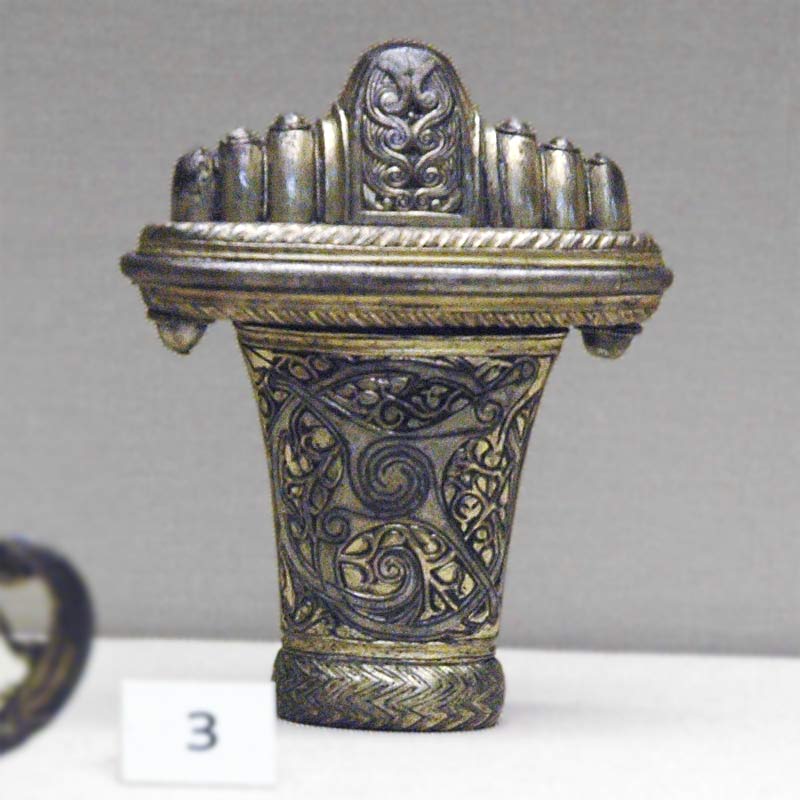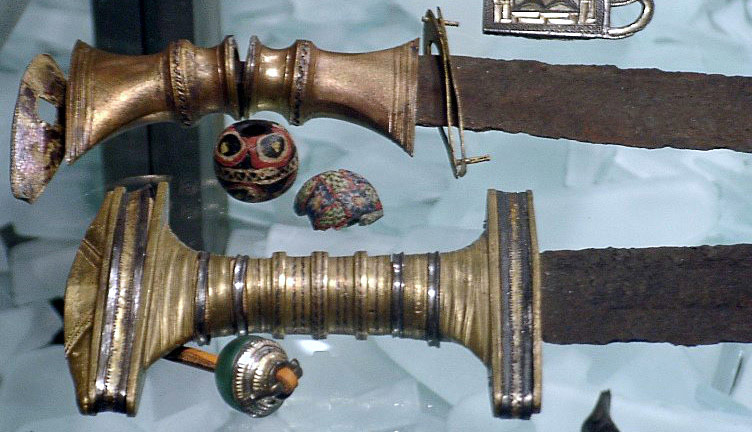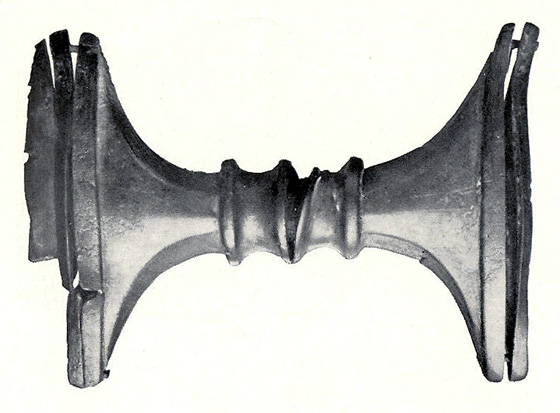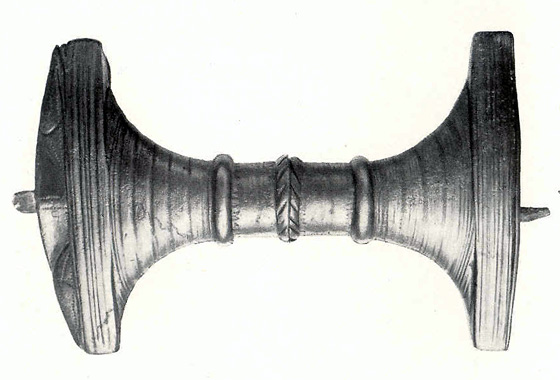Patrick's made some changes to his site, added some nifty new information and has posted this incredible new Anglo-Saxon sword.
WOW.
[ Linked Image ]
[ Linked Image ]
[ Linked Image ]
Very cool, the stamp is a nice touch! Barta is definitely one of the great talents out there, in the top ten in my opinion and probably in the top 5.
Good heavens Miss Sakamoto, you're beautiful!
Seriously though, let alone the (gorgeous) sword, that scabbard is one of most handsome in design and execution I've ever seen. Actually I can't remember ever seeing one I liked more. Mr. Bárta's work is exceptional in photographs; I'd love to see one of his Anglo Saxon pieces in person. Guess I'll either have to hope he makes a show in the USA, or save up for a custom project ;).
Seriously though, let alone the (gorgeous) sword, that scabbard is one of most handsome in design and execution I've ever seen. Actually I can't remember ever seeing one I liked more. Mr. Bárta's work is exceptional in photographs; I'd love to see one of his Anglo Saxon pieces in person. Guess I'll either have to hope he makes a show in the USA, or save up for a custom project ;).
| Russ Ellis wrote: |
| Very cool, the stamp is a nice touch! Barta is definitely one of the great talents out there, in the top ten in my opinion and probably in the top 5. |
There's better ones then him? IMHO he's the best swordsmith alive at the moment. Not just the quality of his pieces, but also the range and perfection in every craft that is part of the sword making process. If you consider that in the past, a lot of things were seperated amongst specialized craftsmen, and he does them all by himself. Not only that, he covers such a huge range of different swords from different periods. I know from personal experience, that if you don't specialize in something specific, it's much much harder to get good at everything, because you lack the time to get enough experience in everything. Yet in most fields he equals or even surpases most others. Then added on top of that, Patrick mostly uses traditional methods. I don't know exactly how far he goes with that, and where he switches to modern powertools, but by the looks of the photos on his site, and mentions of the amount of time he spends on making his blades, he goes pretty far with it. So IMO he definately holds a firm position as the no. 1 swordsmith of this time :)
| Jeroen Zuiderwijk wrote: |
| There's better ones then him? IMHO he's the best swordsmith alive at the moment. Not just the quality of his pieces, but also the range and perfection in every craft that is part of the sword making process. If you consider that in the past, a lot of things were seperated amongst specialized craftsmen, and he does them all by himself. Not only that, he covers such a huge range of different swords from different periods. I know from personal experience, that if you don't specialize in something specific, it's much much harder to get good at everything, because you lack the time to get enough experience in everything. Yet in most fields he equals or even surpases most others. Then added on top of that, Patrick mostly uses traditional methods. I don't know exactly how far he goes with that, and where he switches to modern powertools, but by the looks of the photos on his site, and mentions of the amount of time he spends on making his blades, he goes pretty far with it. So IMO he definately holds a firm position as the no. 1 swordsmith of this time :) |
It's very hard to quantify what makes the "no. 1" swordsmith I think. Often it is merely a matter of personal preference most other things being equal. Based on the pictures I've seen and the reports I've read he is definitely up there in my book however.
I've handled an example of Patricks work and I also have an upcoming commision in his que. He's definitely one of the top smiths currently working in the field, IMHO. However, individual makers approach the craft from different perspectives and avenues that give their work individuality and many of them are different enough to make comparing their work rather difficult. Claiming any one of them is "the best" is a rather narrow road to travel. I've only see a handful of smiths working in the historical venue whos work has truly impressed me and Patrick Barta is one of them. (of course this really has nothing to do with the topic of this thread which is the sword itself)
This one is an incredible piece of work for sure and right from one of my favorite periods in histroy.
This one is an incredible piece of work for sure and right from one of my favorite periods in histroy.
That is a very impressive looking work!
Beautiful! I'd like to toss in that I personally agree with Patrick's opinion about "the best." But, Jeroen did say that was definitely his opinion about the matter, so I don't see much wrong with thinking that. Everyone has their ideas about how to rank the value of one's craftsmanship, and if he feels he's the best there is, then I wouldn't argue with him on that point as far as his own opinion is concerned.
I personally wouldn't say it, even though I can't think of anyone who makes nicer looking stuff than Barta... But, I don't know them all and I haven't handled any!
-Gregory-
I personally wouldn't say it, even though I can't think of anyone who makes nicer looking stuff than Barta... But, I don't know them all and I haven't handled any!
-Gregory-
For those who may not have seen it, here is a photo of the surviving hilt-piece/pommel which I take to be this sword's inspiration, taken from myArmoury's Tower of London and British Museum album.
[ Linked Image ]
[ Linked Image ]
This new sword is really one of the best Mr Bartá has done so far (in my opinion). I really love it and seeing the picture of the surviving hilt, it's a very accurate re-creation. I'm very happy to have one commissioned sword in Patrick Bartá's waiting list, even if it isn't a patter-welded blade (maybe later, when I can afford it).
Cheers,
David
Cheers,
David
Chris-
Here is a larger photo of the pommel found at the British Museum. I took this photo last year during my visit to London. It's listed as a silver gilt sword pommel and is dated to the late 8th century AD.
 Attachment: 65.12 KB
Attachment: 65.12 KB

Silver gilt sword pommel
From the British Museum, London
Here is a larger photo of the pommel found at the British Museum. I took this photo last year during my visit to London. It's listed as a silver gilt sword pommel and is dated to the late 8th century AD.

Silver gilt sword pommel
From the British Museum, London
Thanks for posting the larger image Nathan, it's beautiful! I've long been intrigued by this fragment.
Is anyone aware of a more complete artifact which features a similar construction? The much later bronze hilted sword from the Suontaka woman's grave comes to mind in that it seems to represent a known style recreated utilizing different materials, and features a metallic grip which at least appears to be of a piece with the pommel and guard. Any others?
Is anyone aware of a more complete artifact which features a similar construction? The much later bronze hilted sword from the Suontaka woman's grave comes to mind in that it seems to represent a known style recreated utilizing different materials, and features a metallic grip which at least appears to be of a piece with the pommel and guard. Any others?
| Jeroen Zuiderwijk wrote: | ||
...Not just the quality of his pieces, but also the range and perfection in every craft that is part of the sword making process. If you consider that in the past, a lot of things were seperated amongst specialized craftsmen, and he does them all by himself. Not only that, he covers such a huge range of different swords from different periods... |
I agree with Jeroen, just looking through Patrick Barta's website, I am simply awestruck by what Patrick has accomplished and at a relatively young age. He is truly gifted... the Renaissance man of sword crafting. His engraving and jewlers work really shines. And his pattern-welded blades are true works of art, especially considering he makes his own steel. There are surely other swordsmiths we could praise. Some of them with little recognition, as of yet. (For instance our own Jeff Pringle can make very complex and beautiful patternwelded blades.) :D
After the hundreds of hours of dedicated labor to bring the Fetter Lane sword into existence, IMHO Patrick Barta deserves the recognition that Jeroen has given him. And though I am certainly biased too, my current opinion is the same as Jeroen's. And I can't wait to see what Barta does in the future!
ks
| C.L. Miller wrote: |
|
...Is anyone aware of a more complete artifact which features a similar construction? The much later bronze hilted sword from the Suontaka woman's grave comes to mind in that it seems to represent a known style recreated utilizing different materials, and features a metallic grip which at least appears to be of a piece with the pommel and guard. Any others? |
Hi C.L.
I don't know if this is what you are looking for... They are at least 300 years earlier than the Fetter Lane fragment, however, I think they have a somewhat similar construction. As for the Fetter Lane, I believe I heard that the grip core was wood and the gilted silver we see is just the covering for the wood core. I do not know if the upper guard and pommel and upper part of the grip are all still connected but they seem to have been made separately and not of one piece. If the upper part of the tang is still present it might hold everything together.
Sure would like to see and x-ray of it.
ks

From Ejsbøl Bog with Bronze Grip. Note upper sword hilt with grip in two pieces. Photo by Jeroen Zuiderwijk

Photo from "Das Zweischneidige Schwert Der Germanischen Volkerwanderungszeit” by Elis Behmer, Stockholm 1939

Photo from "Das Zweischneidige Schwert Der Germanischen Volkerwanderungszeit” by Elis Behmer, Stockholm 1939
Good thought Kirk, and thanks for posting these photos! It hadn't occurred to me to make the connection with the Oakeshott/Behmer type III hilts like the ones you've posted, but it makes sense. What should also have been obvious to me, but which I did not realize until just now, is that the piece in question looks very much like a conservative variation on the Vendel Oakeshott/Behmer type IV pommels, which also incorporated a sloping section of the grip into the lower portion of a sandwich pommel... The Fetter Lane fragment seems as thought it could represent a transitional stage between the older form and what would become the better known pommels so widely used during the Viking age.
[ Linked Image ]
[ Linked Image ]
Hi guy's.
Nice pic's. I'd have to chime in and say Patrick B, Vince E, and Kevin C, Tinker, Don Fogg, and J. Hrisoulas all run just about neck in neck for the pattern welding period detail side of things. There's a ore to blade guy in New York, a few in Britain, & Canada, that are pretty fantastic, who I can't remember their names right this second. But like Vince say's, "it's not a competition". Primarily because beauty is in the eye of the beholder, and we'd have to set up a criteria for strict period work, with period tools, methods, materials only? Then get a recognized metallurgical, academic, and blade organizations to back it, judge it, and hold makers feet to the fire, and maintain a membership? Huge task for a genre that only has 500 guy's in the whole earth "competing". Even most of the really sharp period minded Makers out their delve into fantasy, and personal flare elements.
Don't take me wrong, some of Barta's stuff takes my breath away. The fact that he moved away from the cursory fantasy elements of the American "greats" and dove headlong into repousse, etching, enameling, cloisonné, etc? Certainly helped me head in a new direction. Set's his work above most. Words like "superb", fall flat on the rug.
On a different note. Does anyone have specs on these Post roman-migration period blades in reference to original width, thickness, ( especially since most of them are in excavated condition ) and proper length of the blades? For instance, I usually go with 3/16 of an inch thick, but that's just because that's the way I was taught. Were the originals closer to 5/32, or even as thin as an 1/8th? From what you see in the museum pic's some of them look rather substantial, and others kind of wimpy. Or was it a distal taper from 1/4 to very thin? I see lot's of specs for accouterments, but rarely hypothesis on actual blade characteristics. Seems like we have much more evidence and spec's for later period, but not so much for this one in question?
Peace
Robert
Nice pic's. I'd have to chime in and say Patrick B, Vince E, and Kevin C, Tinker, Don Fogg, and J. Hrisoulas all run just about neck in neck for the pattern welding period detail side of things. There's a ore to blade guy in New York, a few in Britain, & Canada, that are pretty fantastic, who I can't remember their names right this second. But like Vince say's, "it's not a competition". Primarily because beauty is in the eye of the beholder, and we'd have to set up a criteria for strict period work, with period tools, methods, materials only? Then get a recognized metallurgical, academic, and blade organizations to back it, judge it, and hold makers feet to the fire, and maintain a membership? Huge task for a genre that only has 500 guy's in the whole earth "competing". Even most of the really sharp period minded Makers out their delve into fantasy, and personal flare elements.
Don't take me wrong, some of Barta's stuff takes my breath away. The fact that he moved away from the cursory fantasy elements of the American "greats" and dove headlong into repousse, etching, enameling, cloisonné, etc? Certainly helped me head in a new direction. Set's his work above most. Words like "superb", fall flat on the rug.
On a different note. Does anyone have specs on these Post roman-migration period blades in reference to original width, thickness, ( especially since most of them are in excavated condition ) and proper length of the blades? For instance, I usually go with 3/16 of an inch thick, but that's just because that's the way I was taught. Were the originals closer to 5/32, or even as thin as an 1/8th? From what you see in the museum pic's some of them look rather substantial, and others kind of wimpy. Or was it a distal taper from 1/4 to very thin? I see lot's of specs for accouterments, but rarely hypothesis on actual blade characteristics. Seems like we have much more evidence and spec's for later period, but not so much for this one in question?
Peace
Robert
| Robert H. Shyan-Norwalt wrote: |
| On a different note. Does anyone have specs on these Post roman-migration period blades in reference to original width, thickness, ( especially since most of them are in excavated condition ) and proper length of the blades? For instance, I usually go with 3/16 of an inch thick, but that's just because that's the way I was taught. Were the originals closer to 5/32, or even as thin as an 1/8th? From what you see in the museum pic's some of them look rather substantial, and others kind of wimpy. Or was it a distal taper from 1/4 to very thin? I see lot's of specs for accouterments, but rarely hypothesis on actual blade characteristics. Seems like we have much more evidence and spec's for later period, but not so much for this one in question? |
Robert-
Let's try to keep this topic about Mr. Bárta. You're welcome to make a new topic with this new question. It would serve as an interesting discussion.
Cheers.
Will do boss.
;)
;)
| Quote: |
| I'd have to chime in and say Patrick B, Vince E, and Kevin C, Tinker, Don Fogg, and J. Hrisoulas all run just about neck in neck for the pattern welding period detail side of things… But like Vince say's, "it's not a competition". Primarily because beauty is in the eye of the beholder, and we'd have to set up a criteria for strict period work, with period tools, methods, materials only? Then get a recognized metallurgical, academic, and blade organizations to back it, judge it, and hold makers feet to the fire, and maintain a membership? |
Everyone gets to make up their own criteria for ‘good,’ ‘bad’ and ‘authentic,’ and I guess if they can convince enough people to join their point of view, then they get to appoint boards and hold competitions. ;)
Period pattern welding has a very specific set of parameters. Layer count, proportions and pattern fall within a fairly tight range for a given period, all we have to do is look at the artifacts, and, in the case of the pattern welding, x-rays of the artifacts and conservator’s drawings of x-rays to get a feel for the variation. “Period” work implies an attempt to capture the spirit or physical essence of the original in some manner, and there are many ways of approaching that – in pattern welding, Barta’s blades come very close to the originals, in my estimation (as long as we’re talking Migration/Viking, the only originals I’ve studied closely). Many modern smiths tend to up the layer count , get the patterns wrong, or finish off the piece in an obviously modern style, and Barta seems to avoid that, or so it seems from the photos I’ve seen. His work looks as if he’s been working with an archaeologist and some period examples, and paying close attention.
:D
When I first discovered his work I was completely awestruck by the refreshingly un-modern flow and proportion of his work. I think it must not be just a conceit or a materials issue that leads him to recreate the old methods, it seems to be a global fascination with the old mindset which leads to a recapturing, among other things, of the esthetic values of the past. This is an incredibly rare achievement.
Few are able to overcome a lifetime's experience with modern design values and come anywhere close to capturing the feel of authentic historical artifacts. In this regard PB's work not only stands out among swordsmiths, it stands out among all the arts and crafts which seek to recapture the past-- classical-style painting, musical-instrument making, etc.
This sort of deep historicity may not be to everyone's taste, but surely it lays some claim to being the pinnacle of a craft which revolves around the recreation of antique objects.
Few are able to overcome a lifetime's experience with modern design values and come anywhere close to capturing the feel of authentic historical artifacts. In this regard PB's work not only stands out among swordsmiths, it stands out among all the arts and crafts which seek to recapture the past-- classical-style painting, musical-instrument making, etc.
This sort of deep historicity may not be to everyone's taste, but surely it lays some claim to being the pinnacle of a craft which revolves around the recreation of antique objects.
Page 1 of 2
You cannot post new topics in this forumYou cannot reply to topics in this forum
You cannot edit your posts in this forum
You cannot delete your posts in this forum
You cannot vote in polls in this forum
You cannot attach files in this forum
You can download files in this forum
All contents © Copyright 2003-2006 myArmoury.com — All rights reserved
Discussion forums powered by phpBB © The phpBB Group
Switch to the Full-featured Version of the forum
Discussion forums powered by phpBB © The phpBB Group
Switch to the Full-featured Version of the forum